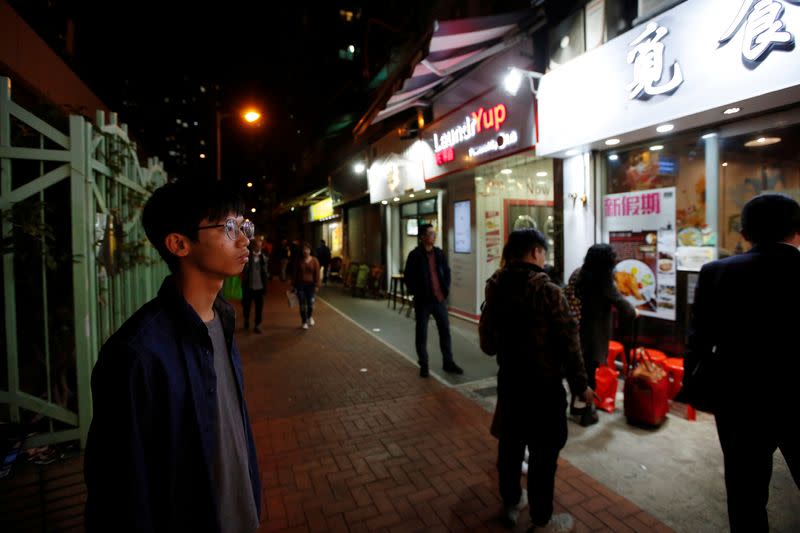Hong Kong exiled activist says he was paid by authorities to be informant

- Oops!Something went wrong.Please try again later.
(Reuters) - The former leader of a Hong Kong pro-independence group says he received up to HK$3,000 ($384) from security officers per meeting to become an informant when he was released from jail in June, before he fled to Britain and sought political asylum.
In November 2021, Tony Chung, who was then 20, was sentenced to 43 months in prison for trying to separate the city from China, and for money laundering. Chung was charged with secession under a sweeping national security law imposed by China in 2020 and denied bail. He pleaded guilty.
He said on Thursday he fled to Britain after he was freed and had formally applied for political asylum.
Reuters couldn't independently confirm key aspects of Chung's version of events, including whether the financial transaction took place, what Chung disclosed to authorities and whether any other activists were also allegedly offered money to be informants.
The Correctional Services Department and Hong Kong Security Bureau did not respond to a request for comment.
At a regular press briefing on Friday, a spokesperson for the Chinese Foreign Ministry in Beijing, in response to a question on Chung, said that those who try to evade legal responsibility will be pursued. The Hong Kong Correctional Services Department said at a press conference they will liaise with relevant authorities to put Chung on a "wanted list".
Beijing imposed the national security law on the Asian financial hub in 2020 after months of anti-government protests. The law punishes acts including subversion, secession and collusion with foreign forces with up to life in prison.
Chung told Reuters in a video call he was offered between HK$500 and HK$3,000 by national security officers to become an informant and was closely monitored and visited by authorities after his release from Tai Lam Correctional Institution.
"They basically didn't give me a choice. I feel like they wanted to test whether I am willing to cooperate and surrender to them," Chung said.
He said he accepted money, in cash, because he felt he had no choice but to become an informant, adding that he provided insignificant information. As a result of being paid in cash he said there was no bank documentation of the transaction.
The activist said he told authorities he didn't meet any special people, showed them his stories on the social media platform Instagram and informed them that he was busy with his studies and work.
Chung said officers demanded that he sign a document related to the National Security Law, prohibiting him from disclosing their communication to anyone or to seek legal advice. He said he signed the agreement.
In response to questions about Chung's case, the Hong Kong Police Public Relations Branch said in an email that "one of the responsibilities of the National Security Department (NSD) is to collect and analyse intelligence and information concerning national security," citing Article 17 of the security law. The police email did not address Chung's allegation of having acted as an informant.
The police email said "recently some individuals who have committed crimes endangering national security openly violated supervision orders or bail conditions and fled Hong Kong, completely betraying trust and integrity" and that police "strongly condemn such behaviour".
MENTAL STRESS
The activist said he had "intermittently fallen ill" since October and that his doctor diagnosed him as having significant mental stress and psychological factors which had led to a weakened immune system.
The trauma, continued surveillance and the impending legislation of a local national security law, also known as Article 23, made him leave Hong Kong, he said.
Chung also told Reuters that he was forced to take part in a "deradicalization" talk in detention where he was taught about Chinese history, parts of which he said glorified China's achievements.
Chung said he was released in June 2023, with his time reduced for good behaviour.
Chung is the former leader of Hong Kong pro-independence group Studentlocalism that dissolved in 2020 before the security law came into effect.
Prosecutors had said at the time he was charged that he acted as an administrator for the Facebook pages of the U.S. branch of Studentlocalism and an organization called the Initiative Independence Party. They also said pro-independence T-shirts, flags and books were seized from his home.
Chung had entered a plea bargain, admitting guilt on the charge of secession and one count of money laundering and pleading not guilty to a sedition charge and another money laundering charge.
Chung told Reuters that he plans to pursue a university degree and contribute to international advocacy work for Hong Kong.
"I want to try my best to push for freedom and democracy in Hong Kong," Chung said.
The former British colony returned to Chinese rule in 1997 with the promise of a high degree of autonomy. Democracy activists and some Western governments say China broke that promise, an allegation that Beijing denies.
($1 = 7.8145 Hong Kong dollars)
(Reporting by Kanishka Singh in Washington and Hong Kong newsroom; Editing by David Gregorio, Michael Perry and Frances Kerry)

